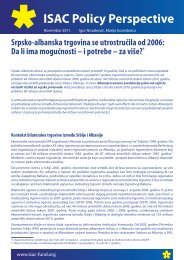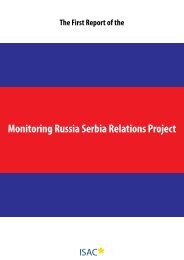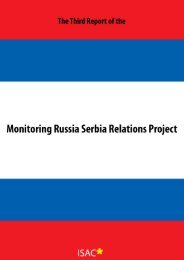the process of security sector reform - ISAC Fund
the process of security sector reform - ISAC Fund
the process of security sector reform - ISAC Fund
You also want an ePaper? Increase the reach of your titles
YUMPU automatically turns print PDFs into web optimized ePapers that Google loves.
Dr Timothy Edmunds THE PROCESS OF SECURITY SECTOR REFORM<br />
Dr Timothy Edmunds THE PROCESS OF SECURITY SECTOR REFORM<br />
A related second generation SSR issue concerns <strong>the</strong> ability or capacity <strong>of</strong> <strong>security</strong><br />
<strong>sector</strong> bureaucracies both to implement policy, and to adequately support <strong>the</strong><br />
oversight and transparency functions <strong>of</strong> parliament. If <strong>the</strong> Ministry <strong>of</strong> <strong>the</strong> Interior,<br />
for example, does not have <strong>the</strong> resources, mechanisms and qualified staff to<br />
provide a detailed breakdown <strong>of</strong> where and how <strong>the</strong> budget for interior ministry<br />
forces is spent, <strong>the</strong>n detailed and effective oversight <strong>of</strong> that budget is difficult.<br />
Capacity problems can manifest <strong>the</strong>mselves in a number <strong>of</strong> ways. These include<br />
for example:<br />
• An absence <strong>of</strong> detailed information on <strong>security</strong> <strong>sector</strong> spending;<br />
• Poor analysis <strong>of</strong> available policy options;<br />
• Unrealistic assessments <strong>of</strong> <strong>the</strong> relationship between goals and resources;<br />
• And administrative structures unable or unwilling to implement <strong>security</strong><br />
policy.<br />
Capacity problems can also be intensified by a lack <strong>of</strong> expertise amongst new<br />
civil servants in <strong>security</strong> <strong>sector</strong> ministries. This may reinforce <strong>the</strong> reluctance<br />
<strong>of</strong> <strong>security</strong> <strong>sector</strong> actors to facilitate fur<strong>the</strong>r <strong>reform</strong> because <strong>of</strong> a perception <strong>of</strong><br />
civilian incompetence in <strong>security</strong> <strong>sector</strong> issues. Again, building capacity is a<br />
long-term component <strong>of</strong> <strong>the</strong> SSR <strong>process</strong>, but without it <strong>the</strong> consolidation <strong>of</strong><br />
democratic procedures is problematic.<br />
In common with <strong>the</strong>se administrative <strong>reform</strong> problems, second generation<br />
SSR issues are visible within <strong>security</strong> <strong>sector</strong> formations <strong>the</strong>mselves. Thus, a commitment<br />
to <strong>reform</strong> at <strong>the</strong> highest level <strong>of</strong> <strong>the</strong> armed forces will be difficult to<br />
implement if <strong>the</strong> mid-level <strong>of</strong>ficer corps remains unconvinced <strong>of</strong> or does not<br />
understand <strong>the</strong> rationale behind <strong>the</strong> <strong>reform</strong> <strong>process</strong>. In <strong>the</strong>se circumstances <strong>reform</strong><br />
programmes may not be adhered to in practice because <strong>of</strong> creative non-compliance<br />
or simply because <strong>of</strong> ignorance. These problems are likely to be reinforced if – as<br />
is likely – SSR involves a transformation <strong>of</strong> <strong>the</strong> role and structure <strong>of</strong> <strong>the</strong> <strong>security</strong><br />
<strong>sector</strong> that will threaten jobs or damage individual interests.<br />
The development <strong>of</strong> <strong>security</strong> <strong>sector</strong> education and training programmes may go<br />
some way towards tackling <strong>the</strong>se problems, but in many cases it is likely that<br />
only generation change within <strong>the</strong> <strong>security</strong> <strong>sector</strong> will address <strong>the</strong>m fully.<br />
Similarly, post-conflict downsizing <strong>of</strong> <strong>the</strong> <strong>security</strong> <strong>sector</strong> can create fur<strong>the</strong>r<br />
problems, and add to <strong>the</strong> cost <strong>of</strong> implementing SSR. While downsizing may<br />
reduce <strong>security</strong> <strong>sector</strong>-specific budgets, it <strong>of</strong>ten transfers expense to o<strong>the</strong>r <strong>sector</strong>s<br />
<strong>of</strong> government finances such as welfare. Effective retraining programmes for<br />
demobilised personnel will add fur<strong>the</strong>r costs to downsizing programmes, but if<br />
<strong>the</strong>y help to effectively prepare former <strong>security</strong> <strong>sector</strong> personnel for life in <strong>the</strong><br />
civilian economy, will bring benefits to <strong>the</strong> overall economy in <strong>the</strong> long-term.<br />
Finally, <strong>the</strong> effective engagement <strong>of</strong> civil-society in <strong>security</strong> <strong>sector</strong> issues is <strong>of</strong><br />
crucial importance to SSR. Civil-society plays three roles in <strong>the</strong> consolidation<br />
<strong>of</strong> democratic control <strong>of</strong> <strong>the</strong> <strong>security</strong> <strong>sector</strong>. First, through <strong>the</strong> media, nongovernmental<br />
organisations, academics and so on, it provides an alternative, nongovernmental<br />
source <strong>of</strong> information on <strong>security</strong> issues for both policy makers<br />
and <strong>the</strong> public at large. This ensures that <strong>security</strong> policy decision makers are <strong>the</strong><br />
best informed that <strong>the</strong>y possibly can be – ra<strong>the</strong>r than, for example, having to rely<br />
on only one source <strong>of</strong> information and analysis.<br />
Second, civil-society provides <strong>the</strong> opportunity for popular debate, discussion<br />
and criticism <strong>of</strong> <strong>security</strong> issues. Again, this helps widen <strong>the</strong> scope <strong>of</strong> <strong>the</strong> input<br />
into <strong>the</strong> <strong>security</strong> making <strong>process</strong> and means that hopefully any decision that is<br />
made will be <strong>the</strong> right one.<br />
Finally civil-society can act as an important mechanism for holding o<strong>the</strong>r actors<br />
in <strong>the</strong> <strong>security</strong> <strong>sector</strong> to account through exposing malpractice, forming critical<br />
judgements and so on. Essentially, it can provide an additional ‘eye’ to look out<br />
for bad practice, inefficiency or corruption in <strong>the</strong> <strong>security</strong> <strong>sector</strong> itself.<br />
CRITERIA FOR SUCCESS<br />
IN SECURITY SECTOR REFORM<br />
Because SSR is a <strong>process</strong> ra<strong>the</strong>r than an end point, measuring ‘success’ in SSR<br />
can be problematic. ‘Success’ – or at least ‘performance’ – is only likely to be<br />
visible after time, when <strong>the</strong> ‘big picture’ can be considered, and while particular<br />
<strong>reform</strong>s may be seen as ‘successful’, but can be undermined if o<strong>the</strong>r elements <strong>of</strong><br />
<strong>the</strong> <strong>security</strong> <strong>sector</strong> system are unchanged.<br />
18 19

















